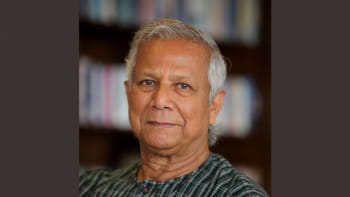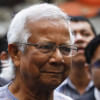Did Dr Yunus deserve such denigration?

We are shocked that the country's only Nobel Laureate, Dr Muhammad Yunus, has been sentenced to six months' jail in a case filed by the government over labour law violations. Given that there are many cases of grave labour law violations that are constantly overlooked in the country, many human rights defenders have rightly expressed concerns about the prosecution of Dr Yunus, calling the charges against him "frivolous" and the verdict "disproportionate". And to our knowledge, no such factory inspection has ever been conducted nor cases filed by the Department of Inspection for Factories and Establishments (DIFE).
According to the case statement against Yunus and three other top officials of Grameen Telecom, recruitment of the company's workers and employees was not made permanent in accordance with the Labour Law 2006 and Labour Rules 2015 after their apprenticeship ended; workers and employees were not given annual leave with pay, leave encashment and cash against leave; the Workers Profit Participation Fund (WPPF) and Welfare Fund were not formed, and 5 percent of the organisation's profit was not deposited to the fund formed in accordance with the Workers Welfare Foundation Act.
Responding to the allegations, the four defendants informed the court that officers and employees of Grameen Telecom were appointed on contract as the organisation itself is operated on contract—which is quite common. Therefore, the allegation of not regularising the job of employees is a matter of administrative and civil case. Despite that, all officials and employees enjoyed provident fund, gratuity, earned leave and retirement leave like permanent employees, and the benefits were more generous than what is obliged as per labour laws, and so should be a non-issue. Moreover, since Grameen Telecom is a non-profit organisation under section 28 of the Company Act, its profit is not for distribution but rather for social development—Dr Yunus himself, or any other board member, has not even received Tk 1 dividend from the company—as profit-sharing provisions do not apply here.
Considering these realities as well as procedural irregularities in the complaint—such as that the legal requirement for the Chief Inspector or an authorised subordinate to file a criminal case has not been met—and also the fact that Grameen Telecom had come to a settlement agreement in April 2022 with the workers and paid, as per Section 234 of the labour act, 90 percent of the 5 percent WPPF (following a High Court order), initiating criminal proceedings against Dr Yunus "is a blatant abuse of labour laws and the justice system," said Amnesty International.
On May 23, 2023, the Hight Court acknowledged the settlement and disposed of the case. And the DIFE inspector, Md Tarikul Islam, the first prosecution witness, admitted his complaint was against the company. So, it is questionable to begin with whether Dr Yunus has committed any crime at all. If there were any issues, they were all of administrative or civil in nature, in which case the defendants could have been given a fine at most. Instead, they were given the maximum possible jail time allowed under the relevant sections of the labour law. It is, as a United Nations special rapporteur has said, "a travesty of justice".
The sentencing of Dr Yunus to six months of jail presumably seeks to deal a huge blow to his legacy and that of his work. We wonder whether his contribution to our country was at all judged when denigrating him like this.


 For all latest news, follow The Daily Star's Google News channel.
For all latest news, follow The Daily Star's Google News channel. 










Comments